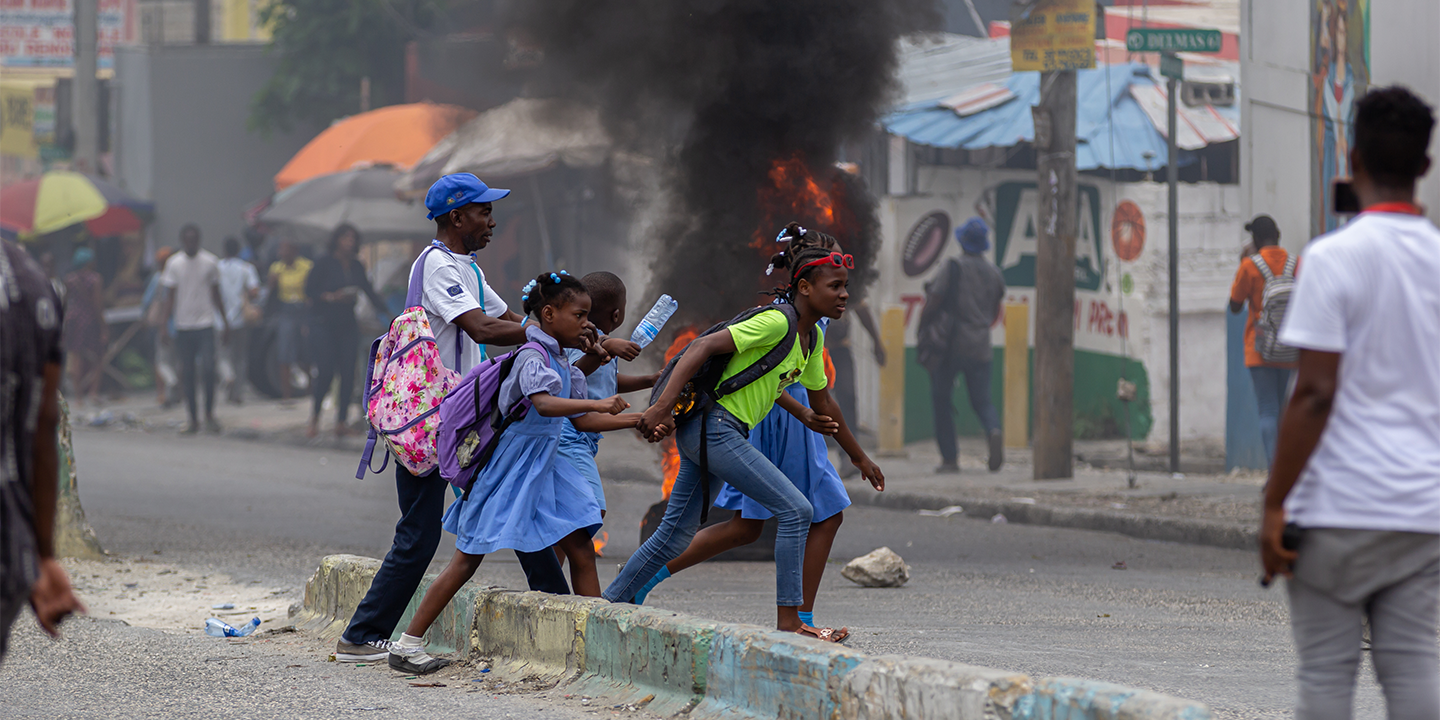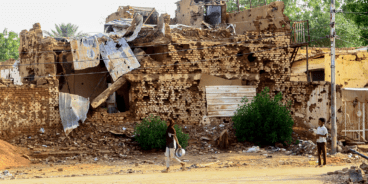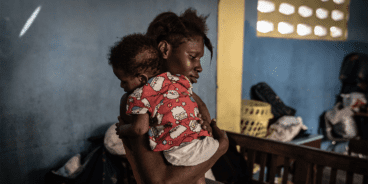

Atrocity Alert No. 436: Haiti, Myanmar (Burma) and Syria
Atrocity Alert is a weekly publication by the Global Centre for the Responsibility to Protect highlighting situations where populations are at risk of, or are enduring, mass atrocity crimes.
UN WARNS OF “TOTAL CHAOS” AMID INTENSIFYING GANG VIOLENCE IN HAITI
On Monday, 21 April, the UN Special Representative for Haiti, María Isabel Salvador, warned that Haiti is on the brink of “total chaos” as escalating gang violence continues to destabilize the country. Coordinated attacks have nearly paralyzed the capital, Port-au-Prince, and are now spreading to previously unaffected regions. In late March and early April, violence surged in the central cities of Mirebalais and Saut-d’Eau, where more than 80 people were killed, according to the National Human Rights Defense Network, and at least 51,000 displaced. Earlier this month gangs seized control of Mirebalais and freed over 500 inmates from a local prison, marking the fifth prison break in less than a year. Special Representative Salvador has indicated this is part of a strategic campaign to dismantle state institutions, instill fear and tighten control.
On 17 April the Inter-American Commission on Human Rights released a statement expressing concern over the escalating violence and widespread human rights violations, emphasizing, “the State has the primary responsibility to implement effective security measures…and protect the population from gang violence.” Since late 2024 the Viv Ansanm gang coalition has engaged in relentless violence, tightening its grip on Port-au-Prince and besieging outlying areas. Only 10 percent of Port-au-Prince remains under government control.
The scale of gang attacks, compounded by clashes with “self-defense groups” – formed by communities to safeguard their families and property, often with tacit police support – has heightened protection risks and fueled widespread panic. According to a new report by the Office of the UN High Commissioner for Human Rights and the UN Integrated Office in Haiti, between 1 January and 27 March at least 1,518 people were killed and 572 injured from attacks by gangs, police operations and acts of violence perpetrated by self-defense groups. Gang members have displayed “extreme brutality,” executing men, women and children inside their homes and shooting others on roads and paths as they tried to flee. In recent weeks, thousands have taken to the streets in Port-au-Prince, protesting the mounting violence and calling for decisive government action.
In response, the Transitional Presidential Council declared a new state of emergency and announced increased support for security forces, among other measures. A new task force has launched operations targeting gang strongholds, including drone strikes using explosive munitions. The use of such weapons in the densely populated capital endangers civilians, complicates the delivery of much-needed aid and may violate international law.
The United States (US), the European Union, Canada and other key international and regional partners should urgently provide sufficient personnel and resources needed to bolster the UN-authorized Multinational Security Support Mission. The US and other states in the region must enforce the UN arms embargo and bolster efforts to curb the flow of illicit weapons and ammunition fueling gang violence in Haiti, including through tightening port and border controls and dismantling trafficking networks.
DESPITE CEASEFIRE, MYANMAR MILITARY CONTINUES AIRSTRIKES AS CRISIS WORSENS
On 22 April Myanmar’s (Burma) military junta announced an extension of its temporary ceasefire, purportedly to expedite relief and rebuilding efforts following a series of powerful earthquakes that struck in late March. However, despite the initial 20-day ceasefire declared on 2 April, the junta has continued to carry out dozens of attacks in populated areas, with devastating consequences for civilians across the country. By 11 April the Office of the UN High Commissioner for Human Rights (OHCHR) reported that after the earthquakes military forces had carried out over 120 attacks, more than half of which occurred after the ceasefire began. According to Radio Free Asia, between 18-20 April at least 50 civilians were killed and nearly 80 injured during a three-day onslaught of junta airstrikes across four major regions – including areas impacted by the earthquakes and territory controlled by ethnic resistance organizations.
Ravina Shamdasani, Chief Spokesperson for OHCHR, stated, “Numerous strikes have been reported in populated areas, many of them appearing to amount to indiscriminate attacks and to breach the principle of proportionality in international humanitarian law.” The latest aerial and artillery strikes reportedly included bombings of a camp for internally displaced persons, a monastery and residential areas of several villages.
Meanwhile, thousands remain without shelter, water or medical care three weeks after the deadly earthquakes. The junta has severely hampered humanitarian relief efforts from reaching vulnerable populations. The junta has previously weaponized humanitarian aid, especially since the 2021 military coup, by systematically denying or blocking aid to civilians, particularly in anti-military strongholds. According to the UN Special Rapporteur on the situation of human rights in Myanmar, humanitarian workers have been stopped, interrogated and extorted at military checkpoints, while soldiers opened fire on a convoy by the Red Cross Society of China. The junta has blocked access to opposition-controlled areas, including in the Sagaing region, which was severely impacted by the earthquake and where populations continue to face airstrikes.
Last week Malaysian Prime Minister Anwar Ibrahim, who chairs the Association of Southeast Asian Nations (ASEAN), held talks with junta leader General Min Aung Hlaing, as well as with the exiled shadow government, the National Unity Government. The talks aim to curb the ongoing conflict to ensure the coordination of humanitarian aid efforts.
ASEAN must ensure that any engagement with the military junta does not confer legitimacy and must demand clear, measurable progress toward ending violence and restoring democracy – reflecting the will of the people of Myanmar who continue to resist military rule. Aid efforts must be neutral, impartial and based solely on need – not manipulated by the junta to strengthen its power. International humanitarian assistance must be delivered through principled, coordinated mechanisms that support local civil society and community-based networks working on the ground. All parties must facilitate rapid, safe and unrestricted humanitarian access and halt military operations.
SYRIAN AUTHORITIES INVESTIGATE COASTAL VIOLENCE AS CALLS FOR JUSTICE GROW
Uncertainty persists in Syria over a month after a wave of sectarian violence struck several areas of the country’s northeast coastal region in early March. According to the UN Children’s Fund, “despite a relative improvement in the overall security situation, fear and mistrust continue to dominate daily life” in the coastal regions. During the violence, hundreds of Syrians were killed. An investigation by Amnesty International into killings in the city of Baniyas concluded that government-affiliated militias deliberately targeted and killed civilians from the Alawite minority – acts that may amount to war crimes. Armed groups loyal to former President Bashar al-Assad, as well as transitional government security forces, including undisciplined factions, have been accused of perpetrating abuses against civilians.
A national fact-finding investigation into the killings has been ongoing since March and on 10 April interim President Ahmed al-Sharaa granted a three-month extension to the fact-finding committee. In a speech delivered after the March violence, interim President Sharaa pledged to hold all perpetrators accountable, regardless of affiliation. The committee, originally established on 9 March, was tasked with uncovering the violations committed across the coastal governorates, identifying those responsible and delivering findings within 30 days.
While the recent extension has provided additional time for the fact-finding committee to ensure a thorough investigation, members of the Alawite community have expressed skepticism about whether genuine accountability will follow. Despite the interim President’s assurances of holding all perpetrators accountable, some Syrian civil society organizations (CSOs) have also questioned whether a committee established by the interim president can truly maintain independence when tasked with investigating violations committed by government-aligned forces.
As the Syrian transitional government attempts to deliver accountability for the recent violence, Syrians continue to call for a comprehensive transitional justice process to address a legacy of atrocity crimes and break the cycles of violence that have been perpetrated in the country for decades. Following the adoption of a constitutional declaration on 13 March, which included a provision on the establishment of a transitional justice body, numerous Syrian CSOs have engaged in dialogues on their vision for transitional justice. Groups such as the Syrian Network for Human Rights have outlined roadmaps for a Syrian-owned and victim-centered process rooted in accountability, truth-seeking, reparations and institutional reform.
The Syrian transitional government must make the findings of the investigative committee public, ensure that all perpetrators are held accountable – regardless of political or military affiliation – and offer reparations to the victims. The transitional authorities should initiate the development of a transitional justice strategy in close consultation with Syrian CSOs and a broad range of stakeholders that reflect Syria’s political, ethnic and religious diversity.
Related Content


Atrocity Alert No. 432: Sudan, Venezuela and Haiti
